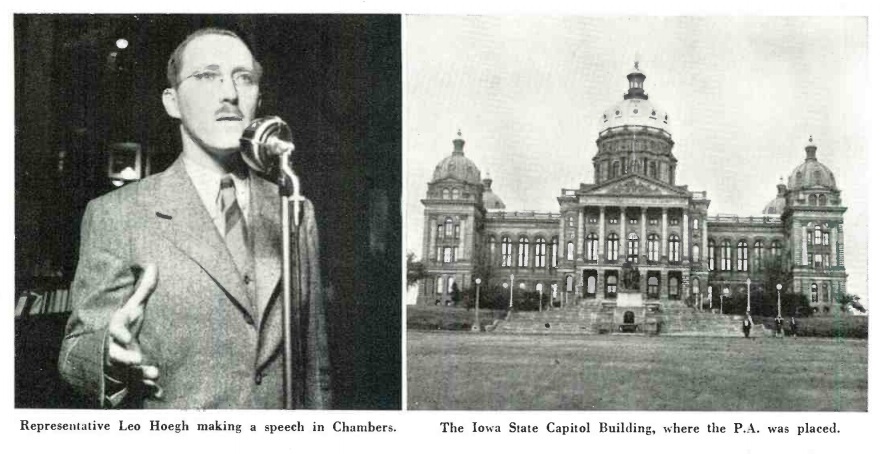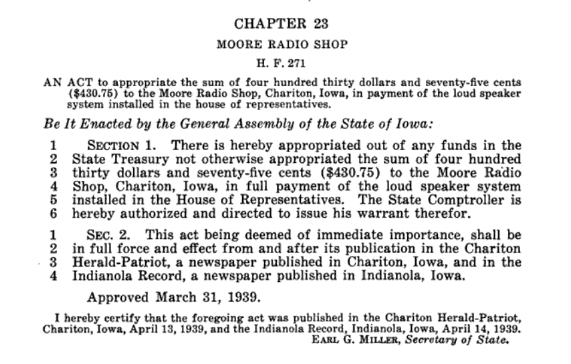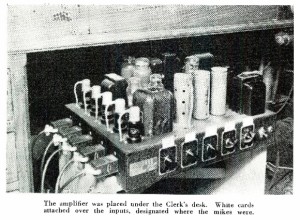 For the first 93 years of statehood, the Iowa Legislature managed to carry on the people’s business without resort to electronic sound amplification. Back then, politicians presumably understood that to be successful, they needed to learn how to project their voice. But in 1939, they decided to solicit bids for an audio amplifier for the House chambers. The low bidder was Lloyd Moore of Moore’s Radio Shop, Chariton, Iowa, and he recounted his experiences with the project in the October 1939 issue of Radio News.
For the first 93 years of statehood, the Iowa Legislature managed to carry on the people’s business without resort to electronic sound amplification. Back then, politicians presumably understood that to be successful, they needed to learn how to project their voice. But in 1939, they decided to solicit bids for an audio amplifier for the House chambers. The low bidder was Lloyd Moore of Moore’s Radio Shop, Chariton, Iowa, and he recounted his experiences with the project in the October 1939 issue of Radio News.
The first step in successfully completing the project was the preparation of a viable bid. To do this, Moore met with members of the legislative committee tasked with overseeing the project. The committee was made of of non-technical men, none of whom had any experience with sound work. A few had used a studio mike, but they were unfamiliar with the problems of having the speakers and microphone in the same room. After Moore’s patient explanation, they readily understood the feedback problem. It was explained that they would need to talk within about eight inches of the mike and use a good voice.
The sealed bid was submitted, with an adequate cushion to allow for the best equipment and a reasonable amount for the labor involved. Moore’s bid was chosen, and he set to work.

Act appropriating payment. Google books.
 The amplifier was over engineered. The power transformer was three times as large as necessary. Four stages of amplification were used. Gain was not excessive, so as to avoid any problems with microphonics. Five inputs were used, each switchable from the main console. One mike was mounted at the Speaker’s desk and one at the clerk’s. Three additional microphones were located in front of the floor, with cords long enough to extend to any speaker’s desk. Future plans called for additional microphones throughout the chamber, with a switch box used in place of the three existing mikes.
The amplifier was over engineered. The power transformer was three times as large as necessary. Four stages of amplification were used. Gain was not excessive, so as to avoid any problems with microphonics. Five inputs were used, each switchable from the main console. One mike was mounted at the Speaker’s desk and one at the clerk’s. Three additional microphones were located in front of the floor, with cords long enough to extend to any speaker’s desk. Future plans called for additional microphones throughout the chamber, with a switch box used in place of the three existing mikes.
The amplifier was placed near the clerk’s desk, giving the Clerk the ability to turn microphones on and off and set the levels. They were particularly lucky that one of the clerk’s staff was “a girl, who had been an operator in a broadcasting station,” and her skill proved invaluable.
The author was honored to address the body in the use of the new system, particularly with regard to what to do in the case of feedback, and noted that this was probably the only time he would address such a distinguished body.
The legislator shown above at the microphone is Leo Hoegh, who was elected in 1936. He resigned in 1942 when called up for duty in the National Guard. He rose to the rank of Lieutenant Colonel and served in Europe. After the war, he returned to Iowa where he served as Attorney General from 1953-55 and Governor from 1955-57.
In 1957, President Eisenhower named him the head of U.S. Civil Defense and a member of the National Security Council. He was in the backyard bomb-shelter business for a time, before returning to the practice of law. He retired in 1985 and died in 2000.
